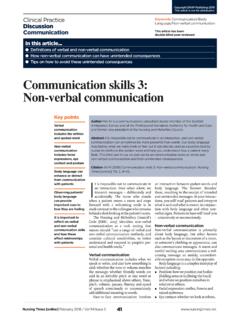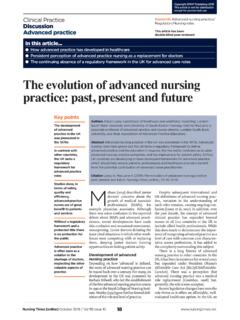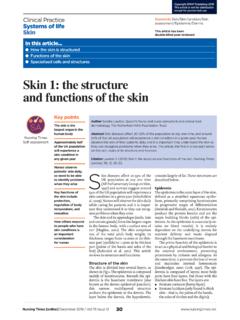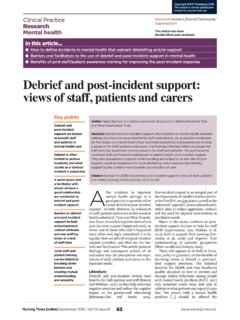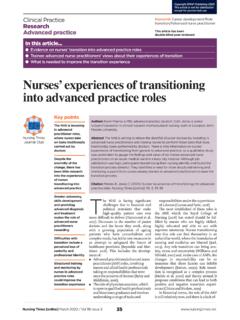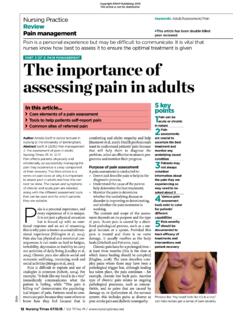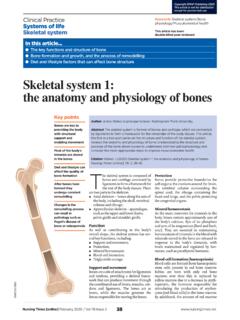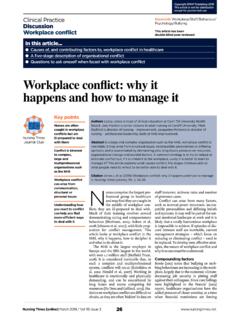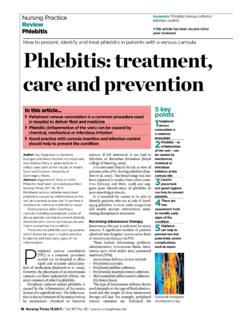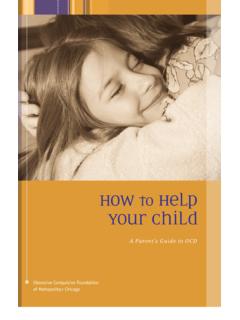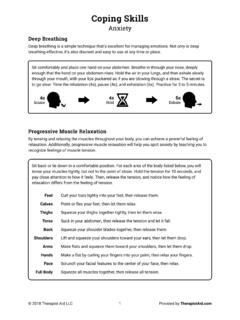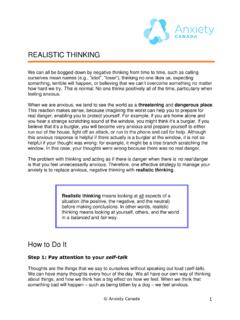Transcription of Communication skills 1: benefits of effective ...
1 Copyright EMAP Publishing 2017 This article is not for distribution18 Nursing Times [online] December 2017 / Vol 113 Issue 12 Communication /Definition/ effective Communication This article has been double-blind peer reviewedIt is estimated that the cost of poor Communication to the NHS is over 1bn per year, and can lead to poor adherence to medication regimens, repeat visits to clinics, disputes and ulti-mately litigation (McDonald, 2016). Effec-tive Communication can:l Enhance the patient experience;l Reduce complaints; l Increase nurses self-confidence, professional standing, career prospects and job satisfaction and reduce stress.
2 Jones (2010) suggests that patients are less likely to remember technological interventions than the Communication and human interaction from health pro-fessionals and judge the quality of their care by these markers. They have more confidence in health professionals who communicate effectively, which in turn makes it more likely that treatment regi-mens are followed or advice taken. Effects of poor Communication Communication is defined as imparting or exchanging information, thoughts or ideas using speech, writing, or some other medium such as signals or behaviour. effective Communication protects patients from potential harm arising from Key points It is estimated that the effects of poor Communication cost the NHS is over 1bn a yearEffective Communication enhances patient experience and reduces complaints It can boost nurses self-confidence, job satisfaction and reduce workplace stress time It is important to reflect on how you communicate and work at improving any weak areasmisunderstandings.
3 While communica-tion failures leading to serious harm - such as the wrong leg being amputated - are rare, even minor shortcomings can have serious repercussions. For example, com-munication errors between colleagues can result in nurses giving the wrong medica-tion, or patients taking an incorrect dose of the right one. Poor Communication in an end-of-shift handover can result in patient harm if important information is not passed from one professional to another. Although no nurse would set out with the intention of communicating poorly, not everyone can be a good communicator at all times. The Care Quality Commis-sion s 2016 Inpatient Survey asked patients whether they received an answer they could understand when asking a nurse an important question: 70% replied yes, always , an increase of four points since the 2006 and 2011 surveys, but a decrease of one percentage point from 2015 (CQC, 2017).
4 Almost a third of patients did not understand nurses explanations some or all the time. Communication with patients can go wrong for a variety of reasons; Fig 1 illustrates typical factors that can have a negative effect on Communication (see part 2). Communication skills 1: benefits of effective Communication for patientsAuthor Moi Ali is a communications consultant; board member of the Scottish Ambulance Service and of the Professional Standards Authority for Health and Care and former vice president of the Nursing and Midwifery effective Communication protects patients from potential harm arising from misunderstandings, and can have a positive effect on staff.
5 This first article in a six-part series on Communication discusses the benefits of effective Communication and offers practical tips on how to reflect on your Communication skills . Citation Ali M (2017) Communication skills 1: benefits of effective Communication for patients. Nursing Times [online]; 113: 12, this Why effective Communication skills are importantl How to overcome anxiety and improve your Communication with patientsl Reflecting on personal and team Communication skillsNursing PracticeDiscussionCommunicationBox 1. Seeing the patient behind the task A hospital nurse told me she needed to take my blood pressure. She duly recorded the results in my notes.
6 Job done? No. She did not tell me the result, whether it was normal, or why it was necessary. It didn t occur to her that I might be relieved to hear: Your blood pressure has returned to the normal range . What the nurse regarded as a task to be completed was an opportunity to reassure a worried patient. Copyright EMAP Publishing 2017 This article is not for distribution19 Nursing Times [online] December 2017 / Vol 113 Issue 12 Moi Ali is author of How to Communicate Effectively in Health and Social Care: A practical guide for the caring professions, published by Pavilion ReferencesCare Quality Commission (2017) 2016 Inpatient Survey: Statistical Release. J (2010) Foreword in Kraszewski S, McEwen A (eds) (2010) Communication skills for Adult Nurses.
7 Maidenhead: Open University A (2016) A Long and Winding Road: Improving Communication with patients in the NHS. Do not allow excessive nervousness to destroy your confidence in yourself or patients confidence in you. If you are nervous about a conversation with a patient or relative remember to:l Identify what you need to tell the patient and the aim of the conversation;l Take deep breaths before approaching the patient;l Pay attention to your body language;l Mentally rehearse your opening words being fluent will put the patient at ease from the on the conversation after-wards using the Communication checklist in Box 2 is also helpful to improve your skills and ActivityThink about a recent shift and your inter-action with patients and use Box 2 to reflect on how you communicated with them.
8 Identify scenarios where you communi-cate well and those where you need to improve. Become conscious of your com-munication style and analyse your strengths and weaknesses. Discuss these with your mentor or manager and identify your learning needs. ConclusionBy spending a little time reflecting on how you communicate, and working at improving any weak areas, you can reap the many personal rewards of being an effec-tive communicator including a better patient experience for those in your care. The second article of this series will explore the barriers to Communication in more detail.
9 NTUnderstanding patients needs Communication failure, such as failing to introduce oneself, can occur when staff regard patients as a series of symptoms and tasks rather than as people with social and emotional needs; this can leave patients feeling dehumanised, while simple positive actions such as an explana-tion can have huge beneficial effects (see case study in Box 1).Patients sometimes selectively process information, hear only what they want to hear, and subconsciously reframe or over-simplify a message if they do not like its content. If your message is not interpreted as planned, understanding where it went wrong and why can help you to rephrase it so it is understood.
10 Teach-back is a useful technique to check patients understanding by asking them to summarise a message they have been given in their own words; in doing this you are checking your capacity to communicate, not the patient s ability to understand. It is important to put yourself in your patient s shoes and anticipate how your message may be received. Try to imagine how you, or someone close to you, might react and how the addition of a few reassuring words may prevent needless worry for with anxietyIt is natural to be nervous when having dif-ficult conversations with patients or their relatives. However, nervousness can have an adverse effect on Communication , so you may forget to introduce yourself or maintain appropriate eye contact; or it may cause you to blush, stutter or frown all of which will interfere with effective Nursing PracticeDiscussionCommunication skills seriesPart 1: benefits of effective Communication DecPart 2: Overcoming barriers JanPart 3: Non-verbal Communication FebPart 4: Unintentional Communication MarBox 2.
